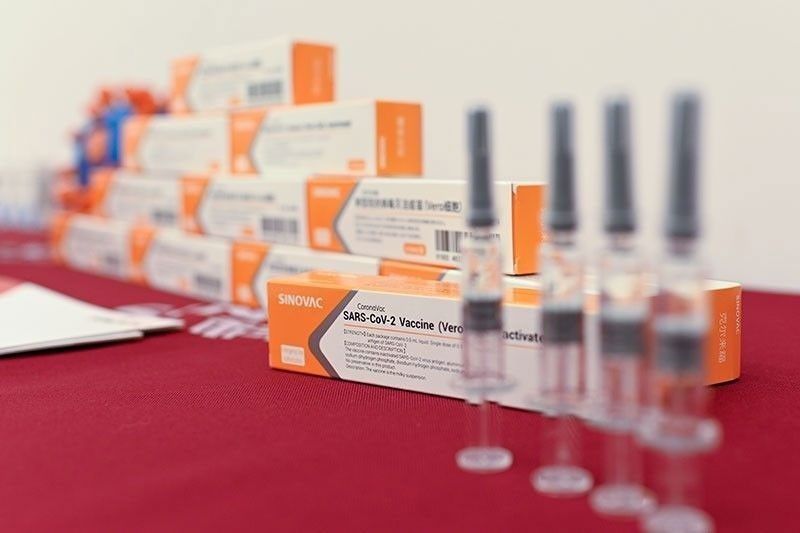Senators question government preference for Sinovac

Galvez: Vaccine deal may still be scrapped
MANILA, Philippines — Senators questioned yesterday the Duterte administration’s apparent bias for procuring China-made vaccines for COVID-19, which they warned has caused resistance to vaccination among Filipinos amid reports of low efficacy and high cost.
At the resumption of the inquiry of the Senate committee of the whole, senators took turns in grilling Health Secretary Francisco Duque III, vaccine czar Carlito Galvez Jr. and other officials of the Inter-Agency Task Force for the Management of Emerging Infectious Diseases (IATF) on the apparent preference for CoronaVac of the Beijing-based Sinovac.
“Just a word of advice: haste makes waste,” Senate President Vicente Sotto III, who chairs the specially convened committee, told IATF officials as other senators hammered on the recent Pulse Asia survey showing that 47 percent of Filipinos did not want to have themselves inoculated.
Like other countries trying to secure doses of COVID-19 vaccines to control the pandemic, Galvez explained that the government merely entered into an “advance market commitment” and no public funds have yet been used to purchase Sinovac vaccines.
“Is that a done deal, considered good (as) sold already? Parang done deal na ba ‘yan? Wala nang atrasan?” Sen. Nancy Binay asked during the committee’s continuation of its inquiry into the state’s COVID-19 vaccination plan.
Galvez replied: “No.”
Asked by Binay if the government can still stop plans to buy Sinovac medicines, Galvez said “Yes.”
Sen. Panfilo Lacson cited the experience of Brazil in using CoronaVac where it was found to have only 50.4 percent efficacy.
“Let me assure Secretary Galvez, there’s no politics in this hearing… We call it an oversight, or check and balance, being exercised by a co-equal branch of government,” Lacson said.
The hearings revealed that government is already in the thick of negotiations with Sinovac to deliver 25 million doses to the Philippines this year.
The initial batch of vaccines is tentatively set to arrive on Feb. 20 even if the company has not yet secured emergency use authorization (EUA) from the Food and Drug Administration (FDA), senators were told.
They asked why the government was considering CoronaVac when it is reportedly the most expensive at P3,629 per dose compared to P2,379 for Pfizer, P610 for AstraZeneca and P366 for Novavax, based on Department of Health (DOH) data last year.
Galvez said the negotiation has reached the second stage or the term sheet where the number of doses to be manufactured by Sinovac for the Philippines was locked in. The final stage would be the actual supply agreement where the payment scheme is detailed.
“The vaccines are being politicized because the people see that they are being forced to accept the vaccine (Sinovac),” Senate President Pro Tempore Ralph Recto said.
Recto and Sen. Aquilino Pimentel III said it would be better if the FDA and DOH’s expert panel on the vaccines gives a definitive statement on the efficacy of Chinese-made vaccines, which use weakened or inactivated COVID-19 virus.
Binay said Galvez and the IATF must see themselves as parents making crucial decisions on the lives of their children in selecting vaccines to be injected on Filipinos.
Galvez replied that once the FDA and the DOH expert panel on vaccines gives their clearance for CoronaVac, he was willing to be inoculated himself by the serum from Sinovac.
He also pointed out that Indonesian President Widodo had himself injected with CoronVac.
Sinovac deal not yet final
Galvez and FDA director general Eric Domingo said that while negotiations are underway, the government is under no obligation to procure from Sinovac if and when the expert panel decides that CoronVac is unsafe or ineffective for Filipinos.
Sinovac is just one of around seven in the government’s vaccine portfolio that was endorsed by the expert panel to the IATF for consideration, the vaccine czar said. The others include Pfizer, AstraZeneca, Novavax, Gamaleya, Moderna and Janssen.
He stressed that there will be no political or business considerations in selecting vaccines that will be allowed for use in the country.
Domingo said the EUA simply paves the way for the procurement process, adding Sinovac has actually sought more time to submit its interim report for the results of phase 3 trials in Brazil, Turkey and Indonesia to the FDA.
“We’ve asked all vaccine manufacturers to also collate their data based on race, particularly Asian, so we could determine if they’re effective for us,” Domingo said.
The FDA has already granted EUA to Pfizer, whose vaccines are expected to arrive in the country by the end of next month under the World Health Organization (WHO)’s COVAX program.
Galvez said that since the procurement will be funded by loans from the Asian Development Bank (ADB) and the World Bank (WB), there will be added transparency and stringent documentation.
Sinovac price being negotiated
On the issue of pricing, Galvez lamented the misinformation being fed to the public even as he cited the confidentiality agreements with all vaccine makers the government is negotiating with.
He said the prices of all vaccines to be procured by the government will come out anyway once the agreements are signed, even as he gave assurance that Sinovac gave a “very good price” to the Philippines.
Senate Majority Leader Juan Miguel Zubiri sought an executive session to allow Galvez to disclose the prices, but the official stood pat, saying revealing the prices would prompt the vaccine manufacturers to leave the negotiations, and potentially harm other deals being arranged in other countries.
Senate Minority Leader Franklin Drilon was not convinced by the explanations and stressed that the country’s economic recovery depends on the acceptability of the vaccines by Filipinos.
“Your explanations are not credible, pardon me. We have a commitment to buy Sinovac, that’s what we see. We’re talking about the health of our economy. We must exert every effort to earn the confidence of the people. All we heard is your insistence (on Sinovac) and this does not augur well for us,” Drilon said.
Private sector commits support
Meanwhile, vaccine makers, pharmaceutical companies and logistics firms have committed to help in the national vaccination program for COVID-19, which is expected to start towards the end of February or early March.
The government is likely to tap the assistance of tens of thousands of midwives, pharmacists and teachers to help inoculate at least 50 million Filipinos this year.
Pfizer Philippines country manager Andreas Riedel said the US-based pharmaceutical giant is committed to make “lasting contributions” to improving the health of Filipinos, adding the firm is already in advanced discussions with the government to forge an agreement to supply its vaccines to the country.
Galvez told the panel that Pfizer vaccines may be the first to enter the country with an initial 50,000 doses before the end of February under the WHO’s COVAX.
The Pfizer vaccines, which require two injections, under the COVAX program would be free and would total 44 million doses or for 22 million Filipinos, Galvez said.
Jannette Jakosalem of Zuellig Philippines, which distributes medicines and vaccines in the country, said the company was ready to help roll out the inoculation program, but stressed that it must be given accurate and updated information by the government, and that concerned sectors must be trained for the logistics.
She said Zuellig and the rest of the logistics chain need numerous and detailed information on various aspects like storage requirements, delivery dates and specific location of vaccination sites.
There must also be a system of validation and alarms on the compliance of all the requirements for the distribution and storage facilities, such as warehouses, she said.
All these must be managed with an IT system that is redundant and interfaced with government systems, she said.
Dave Escalona of Unilab also committed the company’s support for the vaccine rollout and offered to assist the government in the program.
Anthony Dizon of the Cold Chain Association of the Philippines said the group’s members are volunteering to help as vaccines need freezing or below zero temperatures for transport and storage.
Dizon, however, said the government, particularly the IATF, has not communicated with them.
Gov’t regulation
Secretary to the Cabinet Karlo Nograles said the government will regulate the distribution and administration of the vaccines to avoid conflict that may arise once private firms and individuals are allowed open access to the vaccines.
Nograles, who co-chairs the IATF, said they want to avoid a “free-for-all” situation which would put some at an advantage and others subjected to discrimination.?“We have to understand that there is limited supply. So we need to work on the priority segments of the population and society,” he said in an interview with “The Chiefs” on Cignal TV’s One News/TV 5.
He said the government has mapped out a rollout strategy for priority groups, which include frontline medical workers, teachers and uniformed personnel.
Nograles said local government units (LGUs) and private firms may procure the vaccines, but only through a tripartite agreement with the national government and the pharmaceutical company.
So far, AstraZeneca, Moderna and Novavax are the only three pharmaceutical companies open to tripartite agreements.
He pointed out that the national program entails strict monitoring on pre- and post-vaccination activities, particularly for any adverse effect of the vaccine. Also, the vaccines would be administered in two doses, about 21 days apart.
“Everything has to pass through the national government because all these setups have to be put in place. Vaccination in any doctors’ clinic cannot be allowed. It always has to be, has to involve these institutions in the national government,” he stressed.
Strictly not for commercial use
The Palace official clarified that the COVID-19 vaccines arriving next month are not for commercial use.
“Let’s disabuse our minds that once approved by the FDA, it can be purchased commercially or we can buy it in a drugstore, we can have our doctors… have the vaccine,” he said.
He explained that the vaccines being used globally, not just in the Philippines, are only accessible by virtue of an emergency use authority or EUA and are “not commercially available, not for marketing.”
Meanwhile, Nograles assured the public that the IATF is working with technical groups and experts to address the challenges of transporting and storing the vaccines.
Since Pfizer and Moderna strictly require storage in ultra-low freezers, they are likely to be administered in areas with such facilities like Metro Manila, Metro Cebu and Metro Davao.
“We don’t look at the Pfizer as the particular brand we can roll out in far-flung areas,” said Nograles, adding that the same goes for Moderna because of the challenges in transport and storage. – Christina Mendez
- Latest
- Trending































